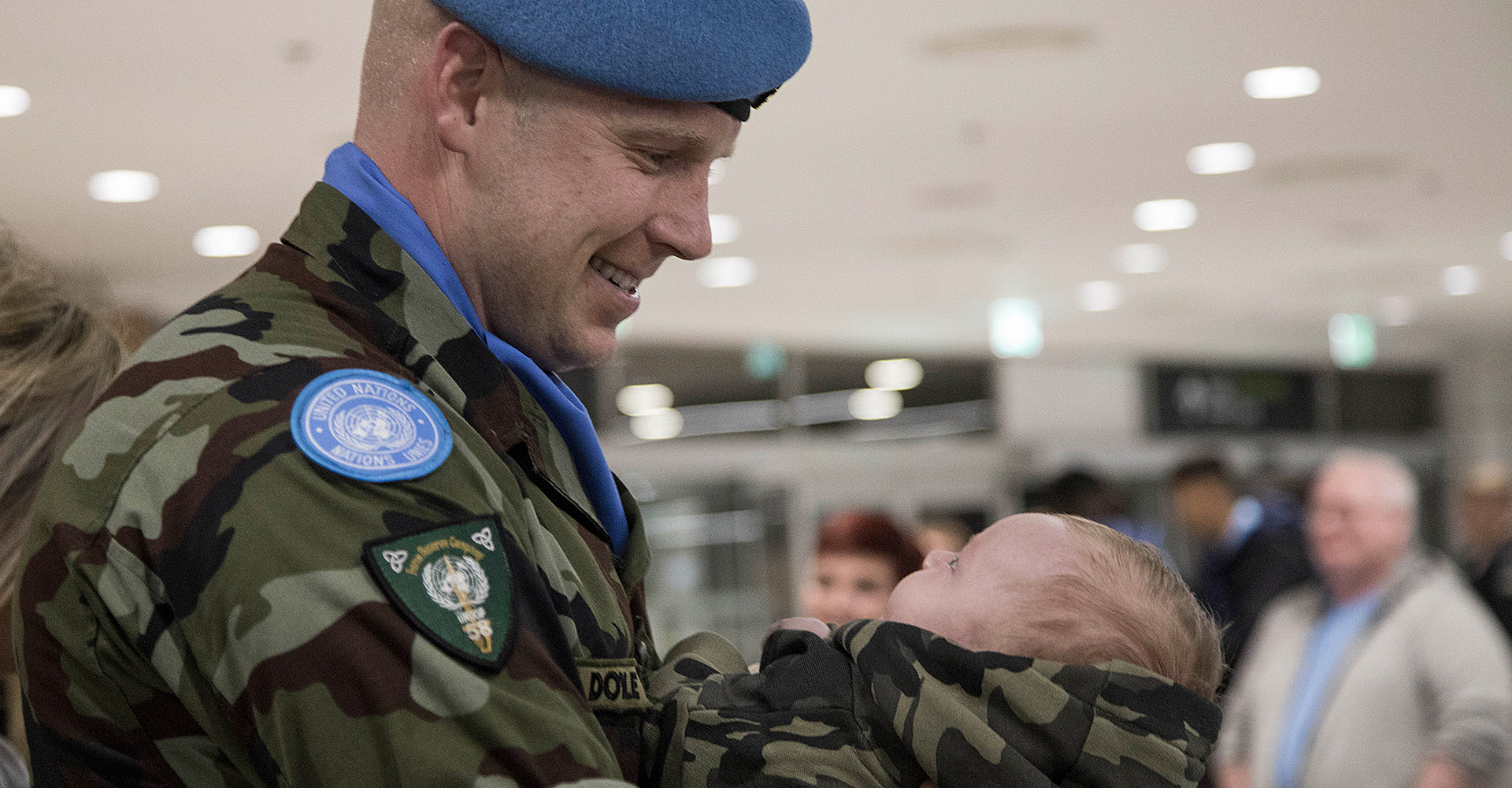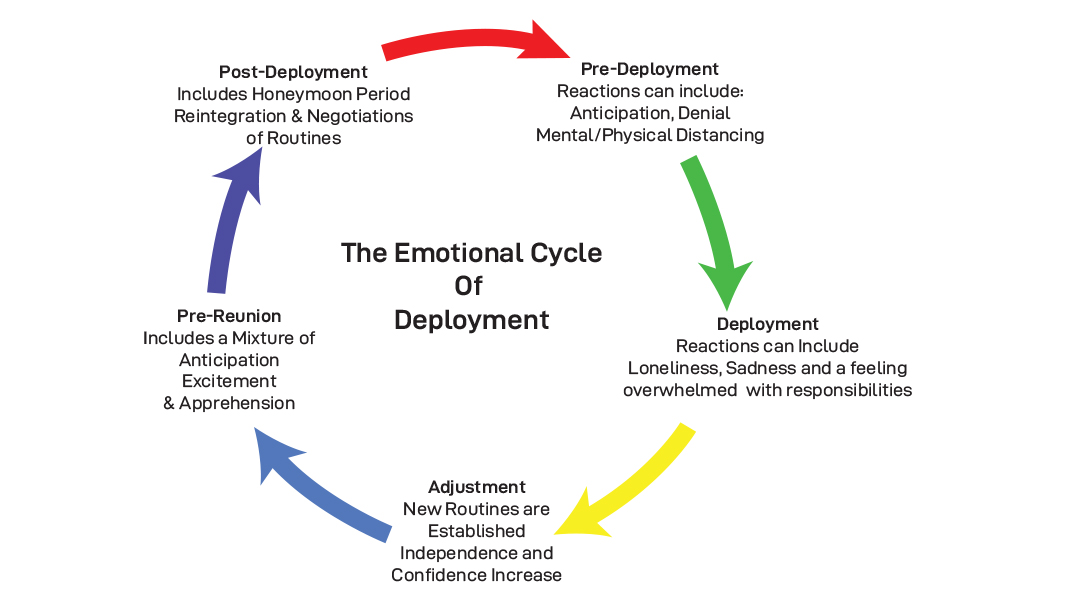
Overseas Deployment
Overseas deployment can be challenging for both personnel serving overseas and their families. The purpose of this section is to provide families and partners of personnel serving overseas with information about the emotional cycle of deployment...

Overseas deployment can be challenging for both personnel serving overseas and their families. The purpose of this page is to provide families and partners of personnel serving overseas with information about the emotional cycle of deployment and some useful information on supports offered by the Defence Forces.
The emotional cycle of an overseas deployment is divided into five distinct stages. These stages comprised the following: pre-deployment, deployment, adjustment, pre-reunion and reunion. Each stage is characterised both by a time frame and specific emotional challenges, which must be dealt with and mastered by Defence Forces families and partners.

Failure to adequately navigate these challenges can lead to significant strife - both for families/partners and deployed Defence Forces personnel. Providing information early about what to expect, especially for Families who have not endured a lengthy separation before, can go a long way towards "normalising" reactions and coping positively with the deployment experience. Understanding of the stages of deployment helps to avert crises, minimise the need for command intervention and/or mental health counselling.
Select the headings below to view more information on each of the stages:
The pre-deployment stage is characterised alternately by thoughts of denial and anticipation of loss of a loved one. As the departure date gets closer, spouses and partners can often ask: "You don't really have to go, do you?"
Eventually, the realisation of the separation to come become more apparent with the increased tempo of pre-deployment training and preparation, and the extended periods long away from home. Your loved one will start to talk more and more about the upcoming mission and their unit. This is part of the "bonding" process and is an essential part of unit cohesion that is an essential part of a safe and successful deployment. On the home front this can create an increasing sense of emotional and physical distance for military spouses and partners. In their frustration, many spouses complain: "I wish you were gone already." It is as if their loved ones are already "psychologically deployed."
As the reality of the deployment finally sinks in, families try to get their affairs in order. “Do” lists are generated dealing with all manner of things including: home repairs, security (door and window locks, burglar alarms, etc.), car maintenance, finances, child care plans and wills, to name but a few. At the same time, many couples strive for increased intimacy. Plans are made for the "best" Christmas, or the "perfect" holiday. Sometimes fears about fidelity or marital integrity are raised or may go unspoken. Other frequently voiced concerns may include: "How will the children handle the separation? Can I cope without him/her? Will my marriage survive?" In this very busy and frenetic time, resolving all these issues, completing the multitude of tasks or fulfilling high expectations often falls short.
Having a significant argument just prior to deployment is not an uncommon occurrence. For couples with a long history and who have experienced previous deployments, this argument is readily attributed to the ebb-and-flow of marital life. For younger couples, especially those experiencing an extended separation for the first time, such an argument can lead to fears that the relationship is over can lead to tremendous anxiety for both parties. In retrospect, these arguments are most likely caused by the stress of the pending separation. From a psychological perspective, it is easier to be angry than confront the pain and loss of saying goodbye for six months or more.
However, the impact of unresolved concerns can have potentially devastating consequences both in the mission areas and on the home front. A worried or preoccupied Soldier, Sailor or Airman can be easily distracted and unable to focus on essential tasks. This can lead to a serious accident or the development of a severe stress reaction. On the home front, significant spousal distress can interfere with maintaining basic routines, concentrating at work, and attending to the needs of children. At worst, this can exacerbate children's fears that the parents are unable to adequately care for them or even that the parent will not return from the mission. Adverse reactions by children can include inconsolable crying, apathy, tantrums, and other regressive behaviours.
Although easier said than done, it is often helpful for Defence Forces families and partners - in the pre-deployment stage - to discuss in detail their expectations of each other during the deployment. These expectations can include a variety of issues, to include: freedom to make independent decisions, contact with the opposite sex (fidelity), going out with friends, budgeting, child-rearing, and even how often letters will be sent or how often contact will be made with home. Failure to accurately communicate these and other expectations is frequently a source of misperception, distortion and hurt later on in the deployment. It is difficult at best to resolve major marital disagreements when face-to-face, let alone over four thousand miles apart.
This stage is normally the period of the first month immediately after your loved one deploys and it is not uncommon for spouses and partners to experience a roller coaster of mixed emotions. Some spouses and partners have reported feeling disoriented and overwhelmed. Some may feel relieved that they no longer have to appear brave and strong. There may be residual anger at tasks left undone. Your loved one’s departure creates a "hole," which can lead to feelings of numbness, sadness, being alone or abandoned. Sleeping difficulties and anxiety about coping are not uncommon. Worries about security issues may ensue, including: "What if there is a pay problem? Is the house safe? How will I manage if my child gets sick? What if the car breaks down?" For many, the deployment stage is an unpleasant and disorganising experience.
Adjustment is a time of establishing new sources of support and new routines. Many rely on the family, friends, or work colleagues their main means of emotional support. The Personnel Support Service (PSS) and the Chaplaincy Service are also useful support services offered by the Defence Forces. As challenges arise, most spouses/partners learn that they are able to cope with crises and make important decisions on their own. They report feeling more confident and in control.
The response of children to the deployment of parent is very individualised and also depends on their developmental age: infants, toddlers, preschool, school age, and teenagers. It is reasonable to assume that a sudden negative change in a child's behaviour or mood is a predictable response to the stress of having a deployed parent. Some of the negative changes you may experience are listed below:
| Negative Changes in Children | ||||
| Ages | Behaviours | Moods | Remedy | |
| Infants | < 1 Yr | Refuses to eat | Listless | Support for parent, GP |
| Toddlers | 1 - 3 yrs | Cries, tantrums | Irritable, sad | Increased attention, holding, hugs |
| Preschool | 3 - 6 yrs | Potty accidents, clingy | Irritable, sad | Increased attention, holding, hugs |
| School Age | 6 - 12 yrs | Whines, Body aches | Irritable, sad | Spend Time, maintain routines |
| Teenagers | 12 - 18 yrs | Isolates, Uses Drugs | Anger, Apathy | Patience, limit-setting, counselling |
Unfortunately, some children may have great difficulty adapting to the stress of a deployed parent. If they are unable to return to at least some part of their normal routine or display serious problems over several weeks, a visit to the Family doctor or speaking the Defence Forces social worker may be a good idea.
Despite all these obstacles, the vast majority of spouses and family members successfully negotiate the adjustment stage and begin to look forward to their loved ones returning home.
The Pre-Reunion stage occurs in the month prior to your spouse or partner returning and is generally one of intense anticipation. Like the deployment stage, there can be a surge of conflicting emotions. On the one hand, there is excitement that your loved one is coming home. On the other, there is some apprehension. Some concerns include: "Will he (she) agree with the changes that I have made? Will I have to give up my independence? Will we get along?" “Will he/she find me attractive?” “Will they have changed?”
Although the separation is almost over, spouses and partners can sometimes find it difficult in making decisions. This is in part due, to increased anticipation of choices or changes that your loved one may make on their return. It is not uncommon to experience a burst of energy at this this stage and there can often a rush to complete tasks before your partner returns, such as decorating the house.
Although the separation is almost over, spouses and partners can sometimes find it difficult in making decisions. This is in part due, to increased anticipation of choices or changes that your loved one may make on their return. It is not uncommon to experience a burst of energy at this this stage and there can often a rush to complete tasks before your partner returns, such as decorating the house.
The Post Deployment stage is when your loved one arrives back in Ireland. This stage is where your loved one transitions from mission life to home life and can last between 3 to 6 months.
It initially commences with the "homecoming", which can be a very joyful occasion involving children, reunited couples and extended family. A "honeymoon" period generally follows in which couples reunite physically, but not necessarily emotionally. Some spouses express a sense of awkwardness in addition to excitement; others, found that they needed time in order to reconnect emotionally first.
Eventually, your returning spouse or partner will want to reassert the role in the family that they had prior to deployment, and this can lead to tension. This will require considerable patience to accomplish successfully.
Reunion is probably the most important stage for both Defence Forces member and their spouse or partner. Good communication, taking it slowly, lowering expectations and taking time to get to know each other again are crucial parts successful reintegration of into the Family. For those struggling with this period the Personnel Support Service (PSS) offer a wide range of supports to service members and their families. Contact information for your local PSS office is available on our Contact Page.
The PSS can provide help and assistance to families and partners of those serving overseas, whether that is before, during or after deployment. Contact information for your local PSS office is available here>>
